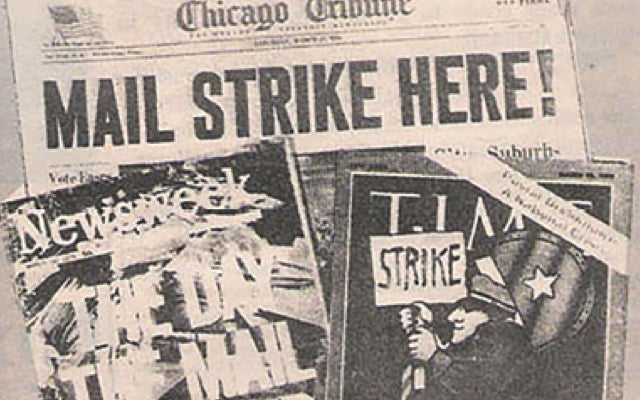
March 18, 1970: Postal Workers Strike
History Site
The first mass work stoppage in the 195-year history of the Postal Service began on March 18, 1970, with a walkout of letter carriers in Brooklyn and Manhattan who were demanding better wages.

The first mass work stoppage in the 195-year history of the Postal Service began on March 18, 1970, with a walkout of letter carriers in Brooklyn and Manhattan who were demanding better wages.
Ultimately, 210,000 (in 30 cities) of the nation’s 750,000 postal employees participated in the wildcat strike.
The first mass work stoppage in the 195-year history of the Postal Service began on March 18, 1970, with a walkout of letter carriers in Brooklyn and Manhattan who were demanding better wages.
Prelinger Archives was founded in 1983 by Rick Prelinger in New York City. Over the next twenty years, it grew into a collection of over 60,000 “ephemeral” (advertising, educational, industrial, and amateur) films. In 2002, the film collection was acquired by the Library of Congress,…
John L. Lewis was born February 12th 1880, to Welsh immigrant parents in the coal mining camp of Cleveland, Iowa- one mile East of Lucas, Iowa. He began working in the Big Hill Coal Mine in Lucas, IA as a teenager, joining the UMWA Local #799 in 1900. He began his rise to power in the United Mine Workers of America and served as President of the UMWA for forty years and was founder of the Congress of Industrial Organizations.
Many were home from war and wanted more than ever to live a long full life. Others had worked long days and nights during the war to feed the troops overseas as well as Americans on the home front. Some had migrated to the cities from farms and small towns looking for work.
The Barre Historical Society is the historical society for the City of Barre, Vermont. It is the owner of two historic buildings, the Socialist Labor Party Hall National Historic Landmark and the Union Cooperative Store bakery building, being restored as the Rise Up Bakery.
Near closing time on March 25, 1911, a fire broke out at the Triangle Waist Factory in New York City. Within 18 minutes, 146 people were dead as a result of the fire. This site includes original sources on the fire held at the ILR…
The Flint sit-down strike, which started on Dec. 30, 1936, represented a shift in union organizing strategies from craft unionism (organizing white male skilled workers) to industrial unionism (organizing all the workers in an industry). The sit-down strike changed the balance of power between employers and workers.
The Wayne State University Library System, through its digital publishing initiatives, strives to bring unique, important, or institutionally relevant content to Wayne State University’s academic community and to the larger world. Our Digital Collections represent text, images, and audiovisual material that support this mission through…
The East Side Freedom Library (ESFL) has its home in the former Arlington Hills library, one of St. Paul’s historic Carnegie library buildings at 1105 Greenbrier Street, located in the Payne-Phalen neighborhood.